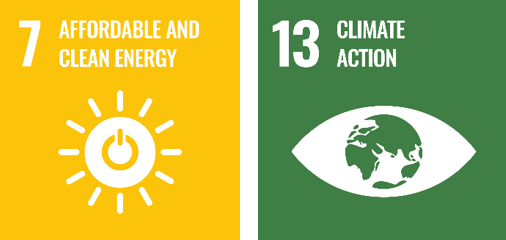The Sustainable Developments (SDGs) were adopted by all UN Member States in 2015 as the blueprint to achieve a better and more sustainable future for everyone by addressing the global challenges we are facing. Although progress is being made in many places, world leaders called for a decade of action from 2019 in order to advance action to meet the goals by 2030.
The RES4BUILD project’s objective “to decarbonise energy consumption in buildings by developing integrated renewable-energy-based solutions tailored to the needs and requirements of the users and the installers” contributes to achieving a number of these goals, listed below. It also fits with the ten priorities the UN Secretary-General has set for 2020, in particular #6, Accelerating the transition to 100% renewable energy. Goal 7: Ensure access to affordable, reliable, sustainable and modern energy
Energy is central to nearly every major challenge and opportunity the world faces today. Be it for jobs, security, climate change, food production or increasing incomes, access to energy for all is essential. Focusing on universal access to energy, increased energy efficiency and the increased use of renewable energy through new economic and job opportunities is crucial to creating more sustainable and inclusive communities and resilience to environmental issues like climate change. Progress has been made in the past decade regarding the use of renewable electricity from water, solar and wind power and the ratio of energy used per unit of GDP is also declining. However, the challenge is far from being solved and there needs to be more access to clean fuel and technology and more progress needs to be made regarding integrating renewable energy into end-use applications in buildings, transport and industry. Public and private investments in energy also need to be increased and there needs to be more focus on regulatory frameworks and innovative business models to transform the world’s energy systems (www.un.org/sustainabledevelopment/energy).

Goal 13: Take urgent action to combat climate change and its impacts
Climate change is now affecting every country on every continent. It is disrupting national economies and affecting lives, costing people, communities and countries dearly today and even more tomorrow. Weather patterns are changing, sea levels are rising, weather events are becoming more extreme and greenhouse gas emissions are now at their highest levels in history. Without action, the world’s average surface temperature is likely to surpass 3 degrees centigrade this century. Affordable, scalable solutions are now available to enable countries to leapfrog to cleaner, more resilient economies. The pace of change is quickening as more people are turning to renewable energy and a range of other measures that will reduce emissions and increase adaptation efforts. Climate change, however, is a global challenge that does not respect national borders. It is an issue that requires solutions that need to be coordinated at the international level to help developing countries move toward a low-carbon economy (www.un.org/sustainabledevelopment/climate-change).
Energy is the dominant contributor to climate change, accounting for around 60 per cent of total global greenhouse gas emissions. Decarbonising energy consumption in buildings is essential to achieving the EU energy and climate goals. While the use of renewable electricity in buildings has grown steadily, the uptake of renewable energy heating/cooling solutions has been slower. RES4BUILD will tackle this challenge by investigating several innovative RES4BUILD technologies, improving their performance, testing and validating them in various climates and paving the way for brining the developed solutions to the market.
The RES4BUILD project will contribute to the above two SDGs through its expected impacts: Solutions that reduce our dependence on fossil fuels for electricity, heating and cooling in buildings; Innovative components and technologies for increased performance in building systems; Best practice to approach renovations of energy systems in a more integrated and systematic way.; Shared knowledge and innovative synergies with industry and other sectors; More efficient operation and optimised interaction with the grid, and thus a lower energy bill for European consumers; and social inclusion and an accelerated energy transition due to the co-design approach with various stakeholders.
For more information on the other SDGs see: www.un.org/sustainabledevelopment/sustainable-development-goals .
Please sign up here to receive more news from RES4BUILD.
